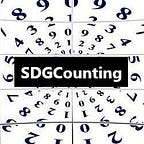Migrants and Refugees During the COVID-19 Crisis
Written by Brady Press
Concern is deepening for the world’s most vulnerable populations as health, economic and social implications of COVID-19 are being felt across the globe. Among them are the millions of refugees and migrants who have been displaced due to conflict and/or disasters in their home countries. In this article, we look at the affect of COVID-19 on SDG 16 — Peace, Justice and Strong Institutions — as it relates to migrants and refugees.
Read on for a curation of the most recent information related to challenges refugees and migrants are facing during the pandemic, and the response from agencies and organizations trying to protect them.
Global Conflict Persists
Despite UN Secretary General António Guterres’ call for a global ceasefire one month ago, conflict-ridden countries such as Afghanistan, Burkina Faso, Libya, Mali, Myanmar, Syria, Ukraine, Colombia, Yemen and more are still engaging in war and conflict, which is counteracting COVID-19 response and feeding the need for people to seek asylum as refugees.
The conversation regarding the continued need for global ceasefire turned to children this week, upon the release of a UN Policy Brief on the effect of COVID-19 on children. With its release, the UN Secretary General reiterated his call for ceasefire and appealed to governments to “protect our children, particularly the most vulnerable — children in conflict situations, child refugees and displaced persons, and children living with disabilities.”
UNICEF Executive Director Henrietta Fore further expressed the need for an end to conflict:
“It would open space for vulnerable populations to access essential services like healthcare; services that are key to stopping a pandemic. It would create opportunities to engage with parties to conflicts for the safe release of children from armed forces and groups.”
What Makes Migrants and Refugees Among the Most Vulnerable?
Already fleeing violence and trauma from their home countries, refugees are not well equipped to tackle COVID-19, and humanitarians are speaking up about the dangers to this population. The Norwegian Refugee Council published an article listing ten things you should know about coronavirus and refugees, which highlights key concerns.
According to the Policy Brief on children and COVID-19, which emphasizes the challenges facing the world’s millions of child refugees, these children are the “most likely be excluded from social protection, and to be negatively affected by [COVID-19] movement restrictions that may keep them obtaining a more secure status.”
Additionally, the UN Refugee Agency (UNHCR) recalls that of all refugees and internally displaced people, “over 80 per cent live in low to middle-income countries, many of which have weaker health, water and sanitation systems and need urgent support.”
Even before the COVID-19 crisis, public health and human rights experts were worried about the living conditions in refugee camps, the risks of which are now heightened. The Director of Humanitarian Health at Johns Hopkins University, Paul Spiegel, notes that 1 of every 3 refugees live in camps, which are frequently located in remote areas with little access to hospitals and healthcare.
There is also an inability to social distance in refugee camps, making them “a perfect storm for COVID-19,” said Spiegel in reference to Cox’s Bazar in Bangladesh, home to nearly one million Rohingya refugees.
Illuminating this reality, Spiegel, in collaboration with other Johns Hopkins University researchers, conducted a study, “COVID-19: Projecting the Impact in Rohingya Refugee Camps and Beyond,” which shows that, in the study, one single infected person in a refugee camp led to at least 1,000 infections in 65–95% of scenarios. In each scenario, the demand for hospital beds exceeded those available.
Furthermore, the International Organization for Migration (IOM) states that migrants and refugees are at greater risk of loss of economic opportunity, eviction, homelessness, stigmatization and exclusion from essential services. They also often lack legal status, are overlooked in response, recovery and preparedness provisions, live in unsanitary conditions and have less access to knowledge about how to protect themselves against COVID-19.
Women and girls are particularly vulnerable in refugee camps, because of the closure of safe spaces, reduced access to counselling and growing health risks for pregnant women as healthcare systems are overwhelmed by COVID-19 response.
Additionally, due to stigmatization and fears regarding their legal status, refugees and migrants often don’t seek medical care — which will further contribute to the spread of COVID-19, such as the case of Syrian refugees in Turkey.
What Is Being Done to Help Them?
Currently, the UN Population Fund (UNFPA) is increasing efforts to assist with COVID-19 response in humanitarian settings, has called for funding to the COVID-19 Global Humanitarian Response Plan and has appealed for an additional $67.5 million for preparedness efforts through April.
The Executive Director of the UNICEF, and the UN High Commissioner for Refugees released a joint statement on Monday “pledging to accelerate work to expand refugee children’s access to protection, education, clean water and sanitation, as the COVID-19 pandemic continues to spread across the globe.”
The International Organization for Migration (IOM) is providing aid and health services to millions of refugees and migrants globally.
In Syria, the World Health Organization (WHO) is working to bolster laboratory and case investigation capabilities, the UN refugee agency (UNHCR) is increasing access to shelters, and the United Nations Population Fund (UNFPA) is expanding hygiene resources for women and children.
Lastly, Greece’s migration ministry will start relocating hundreds of older asylum seekers out of its island refugee camps, and has begun moving 1,600 unaccompanied refugee children from the island camps to other European countries.
More Coverage?
To read our other articles about COVID-19 and the Global Goals, visit our Medium page.
Brady Press is an Associate Director at Changing Our World, where she specializes in building strategic corporate citizenship programs. She is a consultant to SDGCounting and StartingUpGood, and is currently researching how COVID-19 is affecting the Sustainable Development Goals.
